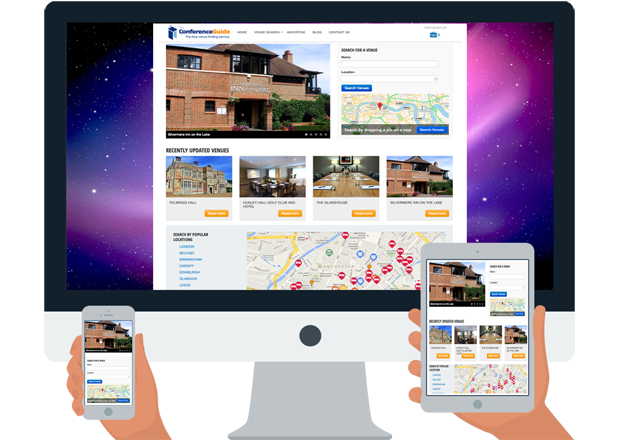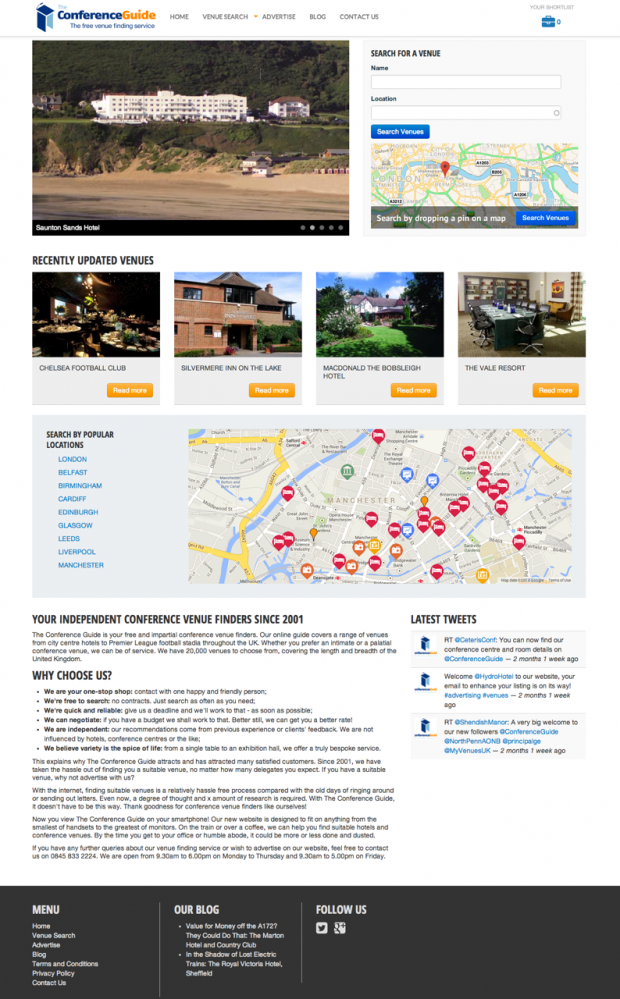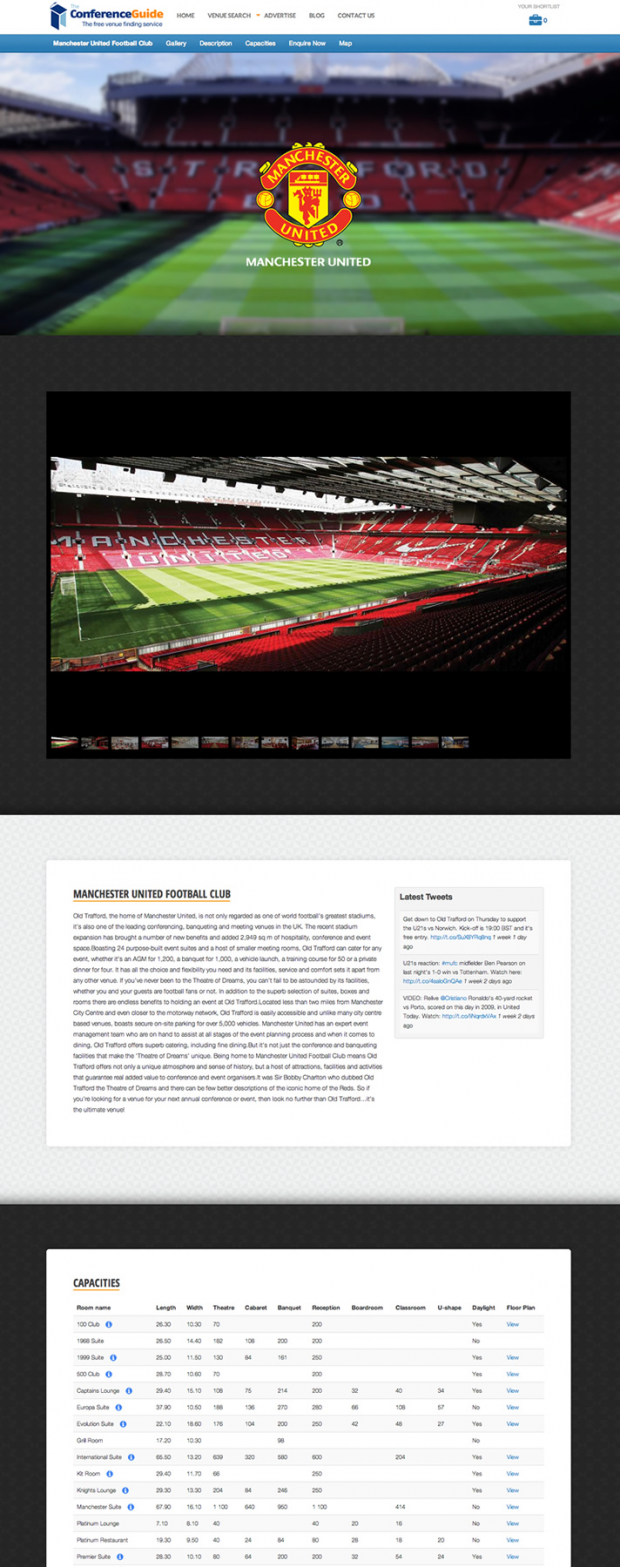 Support for Drupal 7 is ending on 5 January 2025—it’s time to migrate to Drupal 10! Learn about the many benefits of Drupal 10 and find migration tools in our resource center.
Support for Drupal 7 is ending on 5 January 2025—it’s time to migrate to Drupal 10! Learn about the many benefits of Drupal 10 and find migration tools in our resource center.The Conference Guide was created in 2001 as a free to search venue finding service. It enables hoteliers and conference centres to advertise their venues. Companies seeking a suitable venue for their conference, seminar or meeting, would turn to our website. This can be anywhere within the United Kingdom, including exhibition halls and rural retreats.
The company behind The Conference Guide is Contact Media Ventures. They are a digital media agency near Stockport, Cheshire, UK, with specialisms in registration and delegate management, and responsive web design. They have wide-ranging experience in developing websites with Drupal. Therefore, they opted to use Drupal for the latest version of The Conference Guide.
Since the start of 2014, we have decided to give our website a spring clean. In other words, update it to cater for people with smartphones and digital tablets. With more people having such devices, this was a user base we couldn't neglect.

With prior experience of Drupal, we were impressed with its expandability. We liked its flexibility and support for the latest web standards. After gaining success with previous projects for external clients, we decided to apply this to a new version of The Conference Guide. Key to this is support for smartphones and digital tablets as well as PCs.
We have worked with other content management systems in the past, though none have had the flexibility nor intuitive interface seen in Drupal. So much so, we have designed our own template for The Conference Guide.
Goals
- To create a new version of The Conference Guide, ideal for smartphones and digital tablets;
- To make The Conference Guide easy to update;
- Improved integration with mapping websites and GPS systems.
Requirements
Mobile first design: the previous version of The Conference Guide website predated the rise of smartphones and digital tablets.
Bespoke theme: using a framework and utilising Drupal's scalability, a suitable template for all resolutions was needed.
Integration with Google Maps: key to The Conference Guide's website is the use of Google Maps. We opted for Google Maps owing to its compatibility with handheld and portable devices.
Responsive Web Design
First and foremost, Responsive Web Design was our main priority for the latest version of The Conference Guide. With digital tablets and smartphones rising in popularity, especially in the United Kingdom, it is a user base we couldn't ignore. We have seen several websites that have worked well on desktop PCs, which were unworkable on mobile devices. We were fed up with mobile users seeing different pages to their desktop counterparts. In such cases, differing content and graphics or on the other extreme, bandwidth-sapping large images unsuitable for mobile devices.
Hence our latest version of The Conference Guide supporting responsive web design practices. In other words, a new version for the train and the office. A version of our site good for scanning over a quick coffee. To speed up development time we elected to use Drupal, after proven success with previous projects.
Outcome
We fulfilled a need to cater for portable devices. The results of which has made for a more usable website on a variety of mobile platforms as well as desktop PCs. Therefore, today's version of The Conference Guide works extremely well on Android and iOS devices. All a far cry from previous practices of mobile specific pages and style sheets in addition to the default styles.
Furthermore, it supports the latest web standards, such as HTML5 and CSS3. Design and accessibility is an improvement on the previous version, more markedly owing to its 'mobile first' design. Therefore, The Conference Guide's potential as a website for is maximised. Conference organisers without access to a computer can book on their smartphone or digital tablet.
Thanks to the solid framework that Drupal afforded us, we created our own template. This includes a number of features which we have found indispensable, particularly its location modules. Without which, a substantial amount of The Conference Guide would be ineffectual. It is the integration of Drupal's location modules that has enabled us to integrate Google Maps into our website.
As a consequence, venues are searchable from Google Map pins, with suitable venues determined by proximity from a given area. It also loads different types of map pins, all colour coded within a given number of categories. For example, one would denote 'hotels'; another, 'conference centres'.
Technical specifications
GMap + Geo:
Without this module, plus the Gmap and Location modules, the Gmap Location module is significant to the overall running of The Conference Guide. Users can find a suitable venue by means of entering a postcode or place name.
Node Location Relationship:
The above module enables The Conference Guide website to establish a connection with the venue and Google Maps. This matches the address of the venue with the longitude and latitude readings of the node.
Global Redirect
With some of the page filenames different to the previous version of The Conference Guide, this could have meant lost search engine rankings. The Global Redirect module avoids this from occurring.
Responsive Carousel
Thanks to the addition of this module, it has enabled us to add carousel elements onto smartphones and digital tablets. Therefore, no element of The Conference Guide's design is compromised due to screen widths and/or platforms.

